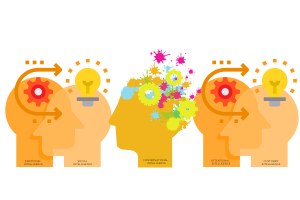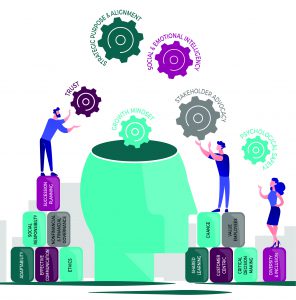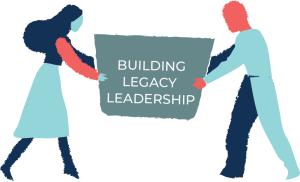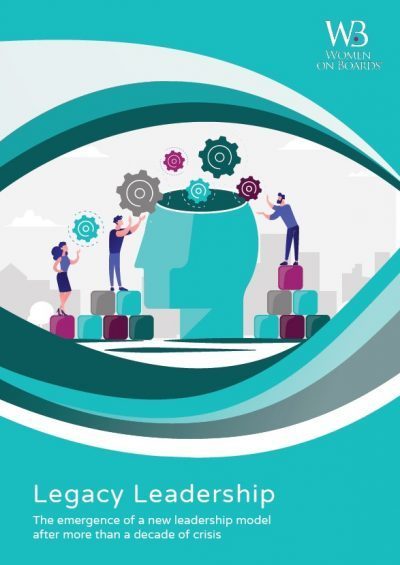Leadership challenges are growing
- Diverse workforces
- Hybrid work environments
- Demanding customers with the power to vocalise their dissatisfaction
- The rapid copying of products and services
- The obligations of leaders to the community, employees, customers, shareholders and stakeholders
- The drive for success – defined differently by all stakeholders involved
- A lack of self-awareness, social intelligence, and conversational intelligence.
Neuroscience approach to Leadership
Organisational neuroscience (ON) is an emerging research domain within the field of management that integrates organiSational behavior with neuroscience. Thanks to functional magnetic resonance imaging (fMRI) and other techniques, we know much more about the brain than ever before. However, professionals in education and corporate training are still struggling to find ways to apply these concepts to develop their leaders. Although a relatively new approach in management research, ON—also referred to as organisational cognitive neuroscience (OCN)—is rooted in “social neuroscience” which emerged as a field in the 1980s by integrating the fields of social psychology and neuroscience. A strong complement to organisational behavior, social neuroscience entails a multilevel approach involving factors both internal to the individual (individual differences, internal mental processes) and external to the individual (environmental factors, organisational contexts).
What a neuroscience approach to leadership aims to do is reduce the leadership gap (the gap between what leaders are delivering and what stakeholder expect from our leaders) by focusing on more recent findings from science and applying them in a business setting to drive better insights, decision-making, engagement, performance and mitigate our exposure to personal and professional risk.
Focusing on the individual and internal processes of our minds and bodies, enable us to manage, influence and respond well to external factors. Makes sense right?
The Legacy Leadership Model of Leadership Development

Legacy Leadership is a model of leadership that allows our leaders to upskill themselves in leadership competencies which start with a good understanding of the 5 modes of intelligence:
1. Emotional 2. Social 3. Conversational 4. Attentional 5. Cultural.
With the Legacy Leadership model of leadership development is based on what leaders need to know/do and how the brain functions, responds, learns and develops. The model applies recent discoveries about the brain, our emotions, our social interactions and displaces many traditional management theories which have created so many issues leadership and organisational today.
Our definition of intelligence is the collective of the different types of intelligence that allows a person to acquire and apply knowledge and skills. Using more than IQ, these modes of intelligence allow us to be positive leaders who inspire others and are moderated by trust, ethics and the impact on others.These modes of intelligence are linked to self-awareness, self-management and relationship management, which enable people to understand and manage their own and others’ emotions in social interactions.
- Emotional Intelligence – is the capacity to be aware of, control, and express one’s emotions, and to handle interpersonal relationships empathetically. We need to have emotional intelligence as it underlies our behaviour and our ability to manage our own behaviour. If we can understand why we respond the way we do to others and environmental factors, we are more likely to understand and take steps to manage this in social settings so that we are creating a positive impact and not a negative one. Before we can gain any real improvement in our social intelligence we need to be self-aware.
- Social Intelligence – is social intelligence is the ability to read and properly react to social signals, monitor, understand, and manage one’s own emotions, and fit into a variety of social contexts.The key difference between social intelligence and emotional intelligence is that emotional intelligence is the ability to recognise one’s own feelings and other’s feelings whereas social intelligence is the ability to understand and interact with people.Social intelligence came about so that people could survive, and it’s about figuring out the best way for you to get along, and come out of a situation with a favorable outcome. In this case understanding the cognitive diversity of a team is critical.
- Conversational Intelligence – Conversational Intelligence® is the intelligence hardwired into every human being to enable us to navigate successfully with others. Through language and conversations, we learn to build trust, bond, grow, and build partnerships with each other to create and transform our societies. There is no more powerful skill hardwired into every human being than the wisdom of conversations. Conversations have the ability to trigger emotional reactions. Everything happens through conversations. Understanding how we project meaning into our conversations enable us to connect with others and, in so doing, let go of much of the self-talk that diverts us from really connecting with others.“To get to the next level of greatness, depends on the quality of the culture, which depends on the quality of the relationships, which depends on the quality of the conversations. Everything happens through conversations!” Judith E. Glaser.
- Attentional Intelligence – a term coined by Linda Ray of Neurocapability is ‘an intelligence that when highly developed allows you to effortlessly but ‘mindfully’ notice where your attention is at any moment and to intentionally decide where you want it to be’. Our attention is a limited resource, yet we are constantly working in environments or in ways that treat it as though it is unlimited. Our attention is constantly seduced by an ever-evolving digital world that constantly interrupts and vies for our attention, Our attention is constantly seduced by an ever-evolving digital world that constantly interrupts and vies for our attention (See blog on How technology is reshaping our brains). And as we are biologically programmed to notice any novelty, our limited attention is being increasingly consumed which exhausts our brain and therefore our cognitive ability to engage well with others and make critical decisions. Focus here is about optimising our mental resources.
- Cultural Intelligence – with all of the above cultural intelligence should come more naturally. But it picks up where emotional intelligence stops. n outsider’s seemingly natural ability to interpret someone’s unfamiliar and ambiguous gestures the way that person’s compatriots would. It is a skill that allows a person to identify the commonalities across different cultures to create common understanding and a foundation for trust.
Legacy Leadership – 6 Foundations & 12 Principles
 A new book based on the learnings from a 10-year Women on Boards program has come up with the foundations and principles of new form of leadership. ‘Legacy Leadership’ acknowledges the importance of ‘human skills’, including a deep understanding of emotional and social intelligence, to stay ‘true’ during stressful, uncertain times.The enormous scale, complexity and urgency of an organisations’ challenges demand more purposeful and sustainable leadership behaviours. Leaders who have the vision and values, the character and competence, to shape the future while also balancing short- and long-term goals, and a sustainable, psychologically safe organisational culture, have a place in this ‘new world’.
A new book based on the learnings from a 10-year Women on Boards program has come up with the foundations and principles of new form of leadership. ‘Legacy Leadership’ acknowledges the importance of ‘human skills’, including a deep understanding of emotional and social intelligence, to stay ‘true’ during stressful, uncertain times.The enormous scale, complexity and urgency of an organisations’ challenges demand more purposeful and sustainable leadership behaviours. Leaders who have the vision and values, the character and competence, to shape the future while also balancing short- and long-term goals, and a sustainable, psychologically safe organisational culture, have a place in this ‘new world’.
The Legacy Leadership framework seeks to provide training that will enhance leadership, drive high performing teams and mitigate personal and professional risk (reputational and legal risk).
The Legacy Leadership Foundations
The Legacy Leadership foundations are the non-negotiables of responsible and sustainable leadership.These are the foundations required to achieve the articulated three strategic leadership priorities to deliver
organisational performance; commit and encourage continuous innovation to maintain a competitive advantage and achieve stakeholder trust. The Legacy Leadership Foundations are:
1. Strategic purpose and alignment
2. Social and emotional intelligence
3. Growth / Benefit mindset
4. Psychological Safety
5. Trust and accountability
6. Stakeholder advocacy.
The Principles of Legacy Leadership
The principles of Legacy Leadership outline points that need to be considered in the design of strategic priorities, in their implementation and in establishing accountability. The principles provide the true north.
However, without the foundations, the principles of leadership will falter.
The Legacy Leadership Principles are:
1. Valued Employees
2. Shared learning and collaboration
3. Customer-centric approaches
4. Critical decision-making
5. Transformation / Change
6. Ethics and transparency
7. Succession planning
8. Corporate social responsibility
9. Adaptability to volatility, uncertainty, complexity and ambiguity (VUCA)
10. Communications and conversational intelligence
11. Financial metrics versus non-financial metrics
12. Diversity and inclusion
Action: Bring Legacy Leadership training into your organisation to drive a new model of leadership and succession planning that delivers positive outcomes and engagement.
 The book “Legacy Leadership – the emergence of a new model of leadership after more than a decade of crisis”, is now available for $17.95 in pdf or ebook versions. Inhouse training on the Legacy Leadership Framework and Competencies is also available. Go here to purchase: Resources – 6peas
The book “Legacy Leadership – the emergence of a new model of leadership after more than a decade of crisis”, is now available for $17.95 in pdf or ebook versions. Inhouse training on the Legacy Leadership Framework and Competencies is also available. Go here to purchase: Resources – 6peas

